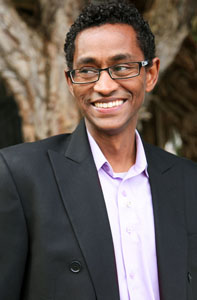Deutron Kebebew (Kresge, ’03, electrical engineering), former foster child and tireless advocate for teens and children, is this year’s winner of the fourth annual Tony Hill Memorial Award.
Kebebew will receive the award as part of the Martin Luther King Jr. Memorial Convocation on Feb. 2 – which happens to be Kebebew’s 35th birthday.
This special honor recognizes individuals whose lives and actions exemplify the late Tony Hill’s work and legacy. Hill, a longtime advocate for social and economic justice in Santa Cruz County, was known for his skills as a community bridge-builder and mediator. He died in 2007 at age 62.
Award recipients receive $500 to donate to the charity of his or her choice.
Past honorees include the Rev. Deborah Johnson, founding minister and president of Inner Light Ministries; Luis Alejo, a public-interest attorney and Watsonville City Councilman who was recently elected to the California State Assembly; and Santa Cruz City Councilman Ryan Coonerty.
"I am really honored and humbled that I am being recognized but I have a long way to go toward really earning it," Kebebew said. "I will continue to do what I do until there is no foster youth in the system."
Passion, commitment and tenacity
Melanie Stern, Hill's widow and a member of the award selection committee, praised Kebebew’s passion, commitment and tenacity, and his ability to move within different groups and populations.
"That’s something Tony was able to do – reach out to different populations and bring people together," said Stern, who also serves on the board of Court Appointed Special Advocates of Santa Cruz County (CASA) with Kebebew.
Born in Ethiopia, Kebebew wound up in the foster care system at age 14 after moving to the United States with his father. His early school years in the San Jose area were rough.
Kebebew missed his parents and homeland, and got teased for his "funny name." He also got teased for his preference for soccer over football and baseball; he even brought his own soccer ball from home. "It was my way of coping," he said.
Class vice president
One of his teachers kept on pushing him; in spite of his resistance, she kept asking him to run for class vice president.
"I said, 'I can barely speak English or write a speech," Kebebew recalled. "'I can barely stand in front of people.' I told her, 'these kids – I don’t think they like me,' and she said, 'give it a try!'"
"My voice shook," he continued. "My hands were sweaty but I gave the speech. I don’t remember what I said but I finished, and the next thing I knew, I got the position. Somehow that transformed the teasing and joking. It gave me some status.”
By the time he’d finished school, Kebebew had earned a prestigious scholarship to UC Santa Cruz, and became a hard-working advocate helping foster youth go to college. At Kresge College he was a house monitor helping foster children. When he graduated, he decided to put his engineering degree aside for a couple of years and give back.
This calling led him to a job with the Santa Cruz Community Counseling Center, where he worked with foster youth. Kebebew went on to become a live-in staff member at a residential program for teenagers in care and ready for transition from foster care to adulthood.
While living with the teens he specialized in conflict resolution and educational success, and later became a coordinator for the Independent Living Program, administered through the Santa Cruz Community Counseling Center.
Founded College Camp
Along the way, while working under the auspices of the Smith Renaissance Society -- an organization that seeks ways and means to help foster, homeless, and runaway youths, orphans, and wards of the court achieve their educational and career goals -- Kebebew began College Camp, which allows high school-age foster-care students to stay for two nights at the UCSC campus, attend class, spend time with former foster youth enrolled at UCSC, and learn about the logistics, possibilities and challenges of college life.
Though he’s not a practicing engineer, he often uses the same analytical skill set.
"I can be a more effective community advocate by looking at systems, figuring out how to make them more efficient, and looking at problems from an engineering perspective," he said.
Looking to increase his impact, Kebebew decided to work toward preventing youth from winding up in the foster care system. "I wanted to support families before they get to the point of fracture," he said.
With this goal in mind, Kebebew became the project director for PAPAS, a Santa Cruz County-based organization that supports fathers' active involvement with their families.
Such projects are crucial because of the relationship between absentee fathers and social problems, Kebebew said.
To make his point, Kebebew recited some alarming facts and figures: Currently, the United States has 24 million children living in fatherless homes. That is one out of every three children; 75 percent of high school dropouts, 75 percent of foster youth and 90 percent of runaway youth are from fatherless homes.
Kebebew is also a member of the Children’s Network executive cabinet, the Proposition 63 Act Mental Health Advisory Committee, the Rotary Club of Watsonville and the Child Abuse Prevention Council.
These days he has so many responsibilities, it’s hard to calculate how many hours he puts in a week.
"Let’s just say I get one day off per week" he said with a laugh.



